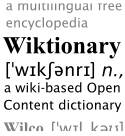Tongue-in-cheek
Tongue-in-cheek is a figure of speech used to imply that a statement or other production is humorously or otherwise not seriously intended, and it should not be taken at face value. The facial expression typically indicates that one is joking or making a mental effort.[1] In the past, it may also have indicated contempt, but that is no longer common.[2]
By 1842, the phrase had acquired its contemporary meaning, indicating that a statement was not meant to be taken seriously.[3][4][5] Early users of the phrase include Sir Walter Scott in his 1828 The Fair Maid of Perth.
History
Putting one's tongue into a cheek was formerly used to signify contempt. For example, in Tobias George Smollett's The Adventures of Roderick Random, which was published in 1748, the eponymous hero is taking a coach to Bath and apprehends a highwayman. This provokes an altercation with a less brave passenger:[6]
| “ | He looked back and pronounced with a faltering voice, 'O! 'tis very well—damn my blood! I shall find a time.' I signified my contempt of him by thrusting my tongue in my cheek, which humbled him so much, that he scarce swore another oath aloud during the whole journey. | ” |
A similar usage appears in 1828 in The Fair Maid of Perth by Sir Walter Scott, "The fellow who gave this all-hail thrust his tongue in his cheek to some scapegraces like himself."
The more modern ironic sense appears in the 1842 poem "The Ingoldsby Legends", in which a Frenchman inspects a watch and cries:[3]
'Superbe! Magnifique!'
(with his tongue in his cheek)
The ironic usage originates with the idea of suppressed mirth—biting one's tongue to prevent an outburst of laughter.[7]
See also
References
- ↑ Lindley, E. H. (1896). "A preliminary study of some of the motor phenomena of mental effort". The American Journal of Psychology.
- ↑ Ayto, John (2009), From the Horse's Mouth, Oxford University Press, ISBN 978-0-19-954379-3
- ↑ 3.0 3.1 Owens, Gene (4 December 2007). "'Tongue in cheek' is cut-and-dried phrase". The Oklahoman (Phrases.org).
... Novelist Sir Walter Scott used 'tongue in cheek' as early as 1828 in 'The Fair Maid of Perth,' but it isn't clear what he meant.
- ↑ Chay, H., Contrastive metaphor of Korean and English revealed in 'mouth' and 'tongue' expressions
- ↑ Zoltan, I. G. (2006). "Use Your Body". Philologia.
- ↑ Smollett, Tobias George (1780), The adventures of Roderick Random
- ↑ Marshallsay, Nick (2005), The body language phrasebook, Collins & Brown, ISBN 978-1-84340-304-3
External links
-
 The dictionary definition of tongue-in-cheek at Wiktionary
The dictionary definition of tongue-in-cheek at Wiktionary